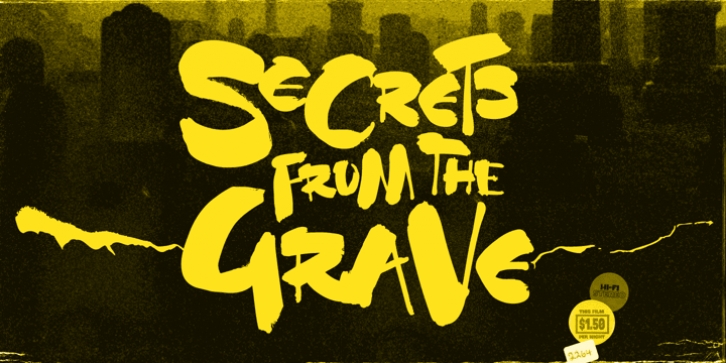Cinema Macabre Font Family was designed by Christopher King, and and published by Wing’s Art Studio. Cinema Macabre contains 2 styles and family package options.
Cinema Macabre: Horror Fonts Torn from the Pages of Giallo
A Hand-drawn Display Font for Creating the Most Diabolical Horror Titles
This loose and inky brush font takes its inspiration from the classic Giallo film posters of the 1960s to 1980s – a cult cinematic subgenre beloved for its stylish visuals, haunting soundtracks and exploitation led marketing. It’s a devilishly drawn design that aims to capture the feeling of vintage horror, preserving analogue details of old print while remaining versatile enough to work across a variety of digital designs.
The Cinema Macabre font family boasts six fonts, each containing a unique set of uppercase and lowercase characters, as well as numerals, punctuation and language support. Add to this a host of custom ligatures, underlines and graphic elements and you have an essential toolbox for creating truly hand-made looking title designs.
Cinema Macabre if a font that rewards experimentation by mixing all the various upper and lowercase alternatives, with interesting combinations waiting to be found and inspire terror across your own movie posters, book covers, albums and editorials. Few other fonts offer the versatility to create such diabolical designs!
A Brief Introduction to Giallo:
In popular cinema, Giallo is a genre of mystery fiction and thrillers often containing slasher, psychological horror, exploitation, supernatural and erotic elements.
The term giallo (meaning yellow) derives from a series of pulp novels published by Mondadori from 1929 taking the name from its trademark yellow covers. The series consisted of Italian translations of mystery novels by well-known authors such as Agatha Christie, Edgar Allan Poe and Raymond Chandler. The popularity of these cheap paperbacks eventually established the word Giallo as a synonym in Italian for a mystery novel.
The cinematic Giallo subgenre developed during the 1960-80s and are noted for their vivid cinematography, memorable soundtracks and inventive gore-filled scenarios. Key examples include Dario Argento’s Suspiria, Tenebrae and Deep Red – stylish films that at once influenced the American slasher (see Black Christmas and Friday 13th) up to todays horror in Censor and Last Night In Soho.

